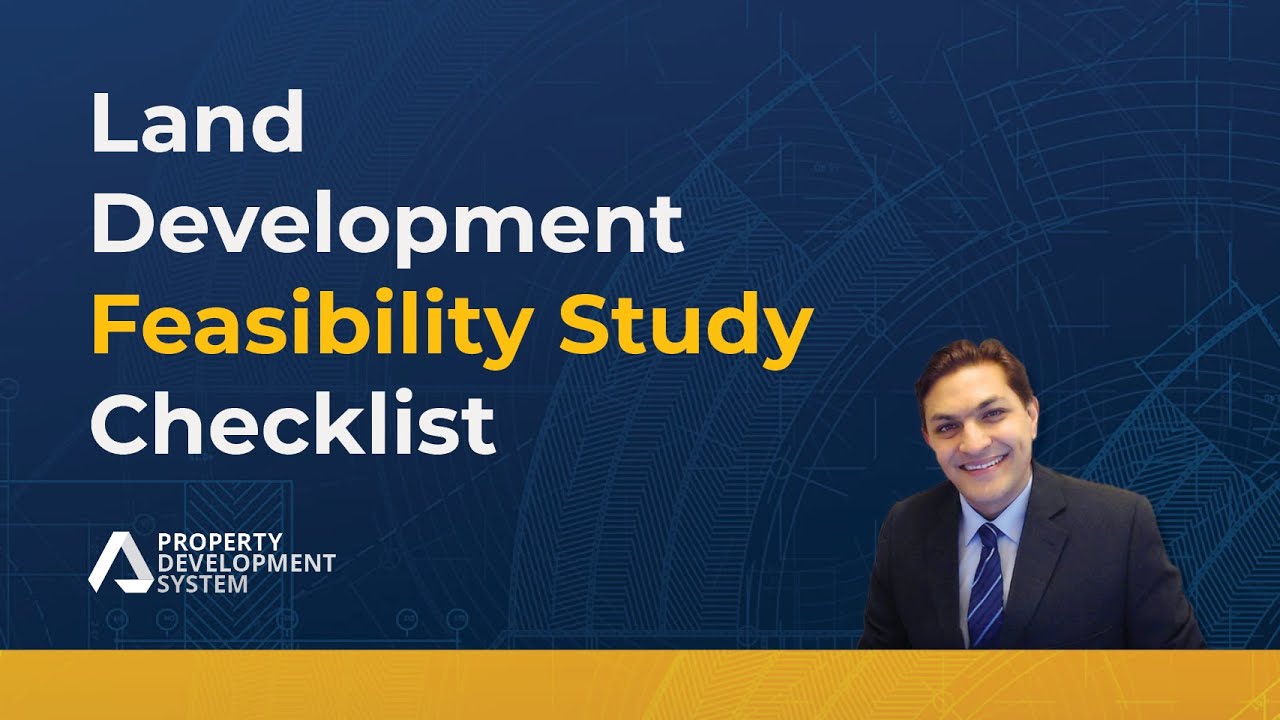Property Development Checklist
Use this classified property development checklist you can trust as your guide for your next property development project. This checklist does not replace professional property development due diligence.
Assessing The Site
As a rule of thumb the first three things that you should look at are:
- Zoning – is the site correctly zoned to accommodate your proposed development. This also covers an examination of restrictive overlays on the site. A working understanding of planning zones and overlays is required in order to determine the highest best possible use of the proposed development site.
- Size – Is the size enough to accommodate four townhouses or three or 10.
- Frontage – Is the frontage wide enough for your development.
- Is the site flat? – A sloping site means adding retaining walls, which further translates into more construction costs. A site contour survey will help you determine that with ease.
- Is the site affected by Flooding or does it fall under a Bush Fire zone? Will, that has an effect on the yield?
- Highest Best Use – is your Local Authority supportive of what you can fit on the site?
Market Analysis
- What’s already being built in the neighbourhood?
- Who are the builders already building it? Find out the costs they are building it at to get an idea of construction costs, as this would help you in your financial feasibility.
- What is the design intent in the local area? This is determining what kind of townhouses or units are being designed in your area.
- What is the demand for such designs in your area?
- What would be the end value of townhouse?
- What is the rent in the current market for a new townhouse & for an old property?
- What are some comparable sales in the nearby area?
- What does the property clock say?
Land Acquisition
- How is the site to be acquired?
- What are the terms of settlement?
- Can I negotiate the price? If not, can I negotiate the terms?
- Is it possible to do a joint venture with landowner?
- Read more about Land Acquisition Process.
Legal Structures
- What would be the best structure that will hold the development site?
- What will be the GST and Capital Gains implication of the development?
You are missing out if you haven't yet subscribed to our YouTube Channel
Property Development Financial Feasibility
- Do your numbers stack up?
- What are various financial models? Develop and Sell Vs Develop & Hold
- What is my development margin?
- What is the maximum I can pay for the site?
- Have I conducted a validation feasibility for my development project?
Professional Reports & Consultants
- Do I need to engage my property development team?
- Do I require any of the following reports?
- Noise Reports
- Environmental Report
- Geotechnical Report
- Traffic Report
- Mining Report
- Any other report that the site may require.
Services & Storm Water
- How will the stormwater be discharged?
- Is there an established point of discharge?
- Is there water to the site?
- Is the water pipe capacity sufficient?
- Are basic utilities connected to the site, for example, Gas, Electricity & Telephone.
Property Development Checklist - MindMap
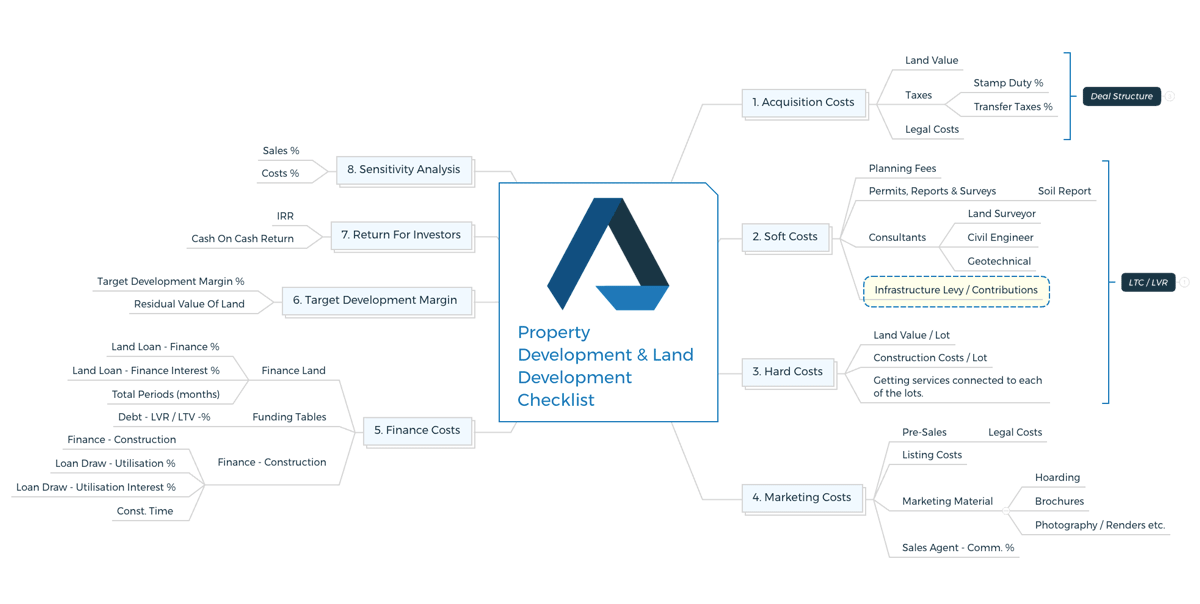
Property Development Checklist - Land Development
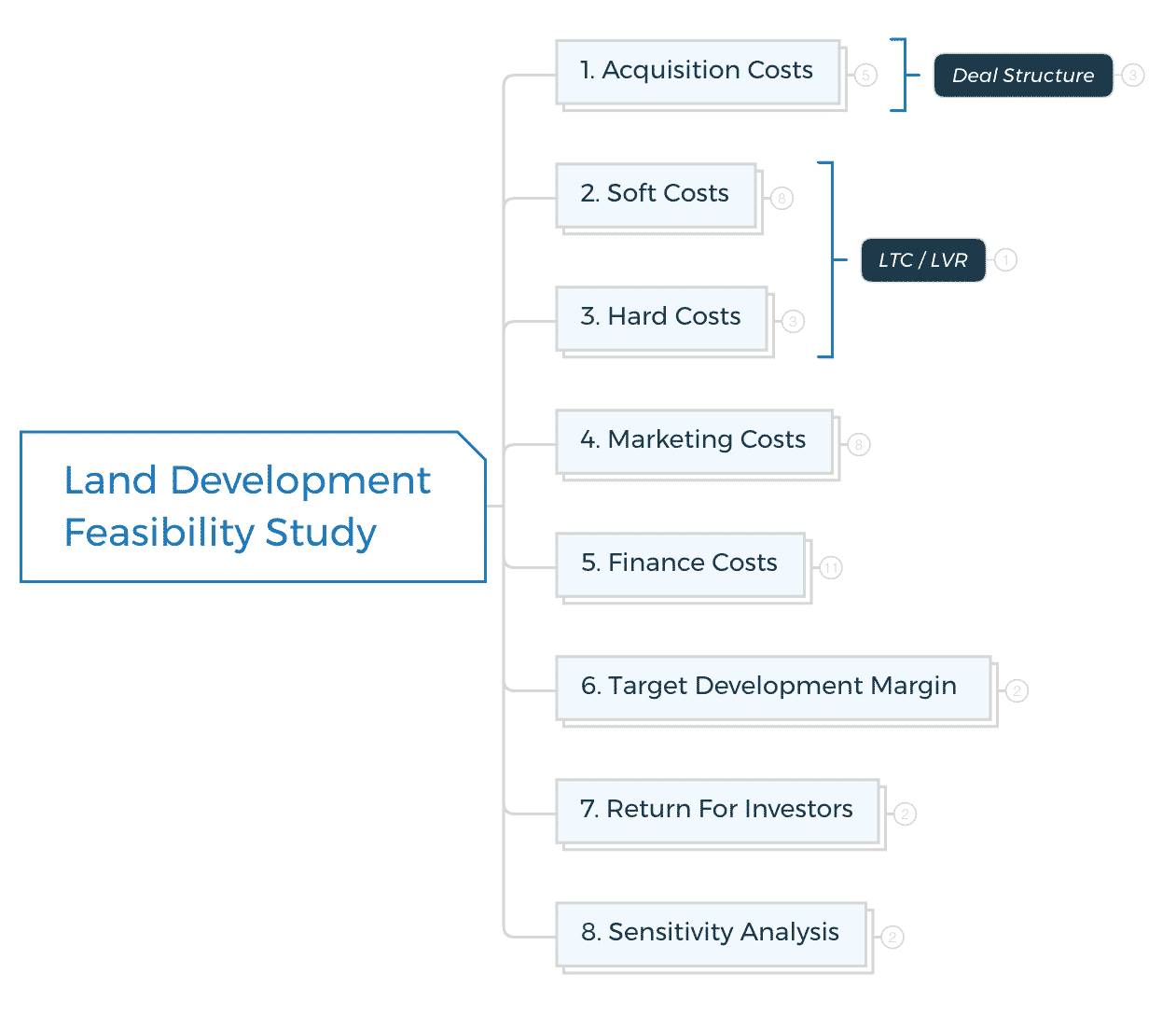
Land Development Feasibility Checklist
Whenever you sink some money into a plot of land, you will want the most out of it and maximise that investment. If you’re going to do this properly, however, you will need to follow a certain process and draw up a land development feasibility checklist to help you. What is this, and how should you proceed?
Maximum Yield
Often, it makes a lot more sense to subdivide a large part of land. This will ensure a much larger yield once you split the land into different sized blocks. There is an art, however, to this process. You will want to develop as many plots as you can and make the best possible use of the site.
Initial Process
This type of process will work wherever you are in the world. Obviously, you will need to find a site, first and foremost, and be sure that it has the necessary requirements and marketing appeal. To do this, you will need to bring in two key figures as consultants to help you make your decision. While their actual job title may vary from country to country, you will need a civil engineer and a land surveyor as part of your team. You may also want to consider a third expert, a geo-tech consultant, to help you test the soil as well. With this type of team, you ought to be able to determine the best possible use of the site, so that you can maximise your return on investment.
Land Development Concept
After this initial stage, you should have a conceptual design and something that you can take through a planning process. In Australia, you will typically get in touch with your local council or a zoning department and will need to adhere to their specific process.
Permitting For Land Development
After due consideration, the council or relevant department will give you the permit to build the chosen number of blocks on your site, but this is only the start of the process. You cannot market your project yet, as you will need to get the all-important services connected in each case.
Get The Edge Now!
Discover the transformative power of our FREE EDGE platform and
unlock a world of opportunities at no cost!
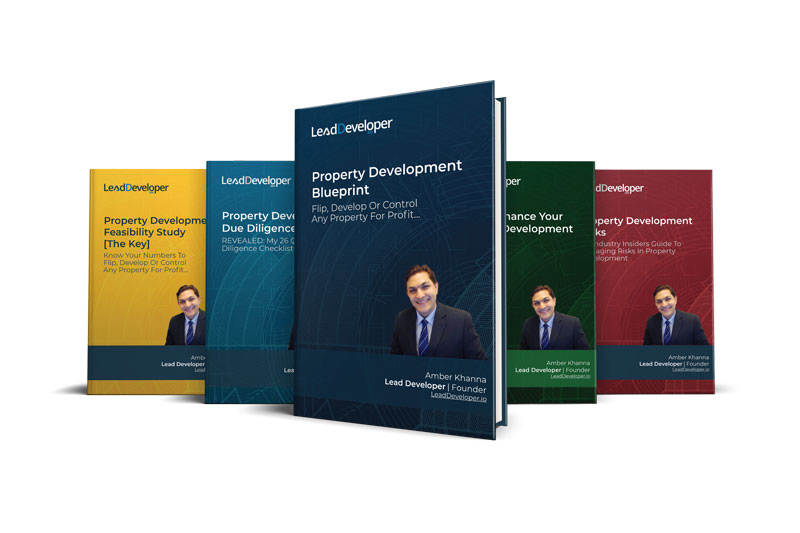
Your Real Estate Toolkit Awaits!
Free eBooks, Courses & Feasibility Suite Trial—Join Today!
✓ Unlimited FREE Trial: Experience the full power of our Feasibility Suite with hands-on demos
—explore without limits, no time pressure & without commitment or credit card!
✓ Learn from Success: Dive into real-life case studies for practical insights.
✓ Engage, Inquire, and Innovate: Ask questions, request features, and engage in lively discussions.
✓ Showcase Your Projects and Gain Insights: Share your projects and get personalised feedback.
✓ Free Resources Galore: Access a treasure trove of free resources,
eBooks & courses to keep you informed.
✓ Exclusive Training: Enjoy members-only training to sharpen your skills.
Utility Connections
You may need to deal with several service providers, and it’s crucial to ensure that they can all proceed without obstruction. You will need to talk to gas, water, and electricity utilities and will need to ensure that you can get rid of any waste as well. This means that you will need to bring in waste management companies to connect sewers and stormwater drains.
Typically, the council or county will own a public facility to handle sewer output and stormwater. You will need to apply for permission to connect to this facility, and your land surveyor or your civil engineer will help you to do this. They will draw up plans for easements and submit to the zoning department or permitting office for subsequent approval. You may need to do this for each individual block, and the detail can be quite involved.
Zoning Plan
The zoning plan will need to be approached in a certain way with certain overlays, and you may need to deal with restrictions relevant to the site. Once you’ve handled all this, however, you should be able to connect the existing infrastructure to the council facility so all the waste management and stormwater can be dealt with properly. You will also need to work with your water authority for incoming water, and this may be a separate process altogether. You may need to pay certain infrastructure charges or levies raised by the council or relevant authority before you can get your DA.
Signing Off / Plan Sealing
Once all the paperwork is in order and everything is connected, you will need to bring in the relevant department once again so that they can seal the plan and confirm that you have carried out the work in accordance with the original consent. Eventually, you will then get individual titles for each one of your blocks.
Construction Decisions
This authorisation will allow you to sell some of the blocks using an “off the plan” sale. This type of contract will not settle, however, until the whole titling process has finished. Look into this carefully depending on where you are in the world, as the process can differ from place to place.
Now that you are ready to go ahead, you have various options. You could sell all of the lots individually “as is,” or you could sell as a complete package, including the house and the land. You could work with a builder who will handle the construction for you and then you could package everything together into a contract of sale.
Cost Analysis & Land Development Feasibility
In summary, you may have to look at several different factors before you can determine feasibility. You will have to take into account certain costs, including acquisition, land value taxes, stamp duty percentage, and perhaps transfer taxes depending on your jurisdiction.
You also have to look at deal structure costs, especially if you are working in a joint venture with the landowner. For example, there may be legal costs associated with a JV agreement. You may have an option on the land that gives you a choice to buy the land in the future.
Don’t forget the soft costs. These include planning fees, surveys, and the soil report, for example. You have to engage your consultants and may need to work with your lender to determine a loan to cost ratio.
Financing For Land Development
Sometimes, a lender may refuse to finance an infrastructure levy or contribution. If they do, then you may need to look at these as additional costs. Just bear in mind that you need to look at a “sources and uses” calculation and remember that any development costs have to be funded from somewhere, whether from debt or from your pocket.
You may have other costs to consider linked to pre-sales, where the relevant contract might cost a bit more than a normal contract of sale. You might need to look at listing costs or marketing materials, together with a sales agent commission.
Lending Decisions
From a financial point of view, a lender will have funding tables that will help to determine what they can advance. They will separate all the soft costs from hard costs, look at the loan to cost ratio, and determine the loan to value ratio to figure out what you can borrow.
Other Criteria
If you’ve done your modelling correctly, construction finance will be taken care of, especially when it comes to the loan draw utilization percentage. Just remember to have a target development margin in your feasibility study and build in a certain percentage to cover the risks that you’re making as part of the development.
Before you begin, you should know how much you should be paying for the land in terms of its value based on its development potential. For example, if you want to make 20% as a margin and you can only fit in a certain number of lots to the land, you will need to plug this into your calculations to help you determine the maximum price you should pay.
Making Your Decision
If you have any investors or limited partners involved, you will also need to know what type of return they expect. This will be another factor that goes into your feasibility. You also need to determine what will happen if costs go up or the timeline changes, known as a sensitivity analysis. Finally, determine what would happen if your sales go up or down by a specific value. Armed with all this data, you will know whether to go ahead with the project or not.
Rules for successful property development project
It is pretty common to forget something critical for the success of a property development project. A developer may sometimes ignore the red flags in the title or in the property itself. This small mistake can lead to the loss of millions.
This is something I can't let happen to you. Following the property development checklist outlined above will make your work go more smoothly and quickly. However, if you want to be successful in real estate, you should also learn the golden rules of property development.
The essential rules to follow before beginning any real estate project. I guarantee that if you use the checklist below, you will never make a mistake in property development.
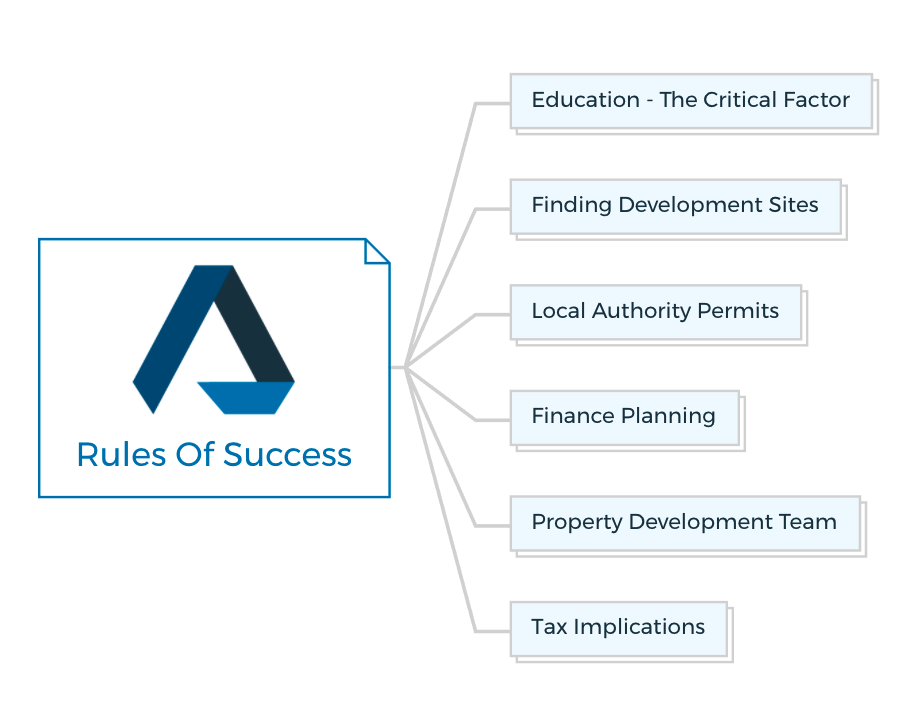
Education – The critical factor
Understanding the theory that goes into developing any property is one of the most significant aspects of real estate development. You don't need an in-depth understanding of every construction area, but you need to communicate appropriately with everyone engaged in your project.
To get a proper understanding and education for property development, you can opt for one of the best-selling courses - The quick start property development course. With my free course, you can master the fundamentals of profitable property development.
It is critical to speak with people who own or are developing land and comprehend the theory. This way, you will get a wealth of information that is hard to gather through courses; you can learn from their experiences and avoid making the same mistakes.
To assist you, I've created a top-notch mentorship programme that has helped many people alter their careers. You might be a part of my mentorship programme, where we'll talk about your project. I will be there for you whenever you require assistance.
Finding Development Sites
As a real estate investor or a property developer, you may have the option of looking at buildings that need to be demolished or a plot of land that can be developed. Although you will still need to get approval from the local government if you choose an existing site, it is pretty unlikely that there will be any issues with your building there.
They may also insist on maintaining some or all of the original elements of the structure you're about to demolish. This might make constructing the building you've designed highly challenging, as well as add considerable additional costs to your project.
Finding a building site is another option that should tackle with caution. It must be in an area designated by the government for commercial development; you may need to confirm what can be built before purchasing.
Sites that have never been built on may also need to be connected to the primary sewerage system and electricity. It can be expensive to add these amenities if they do not already exist on site. It's also essential to consider what you intend to create and who will live in or utilise it while choosing a location.
Permission from local authorities
Whether you live in Sydney, Melbourne, or Brisbane, Australia, the United Kingdom, or the United States, or plan to start a property development project in any of these locations, getting council permission should always be your priority.
The local government will impose tight regulations on the construction of new properties and significant changes to existing ones. It is critical to be informed of the local norms and procedures before purchasing any site or property. The provincial government will decide whether or not you can implement the idea; make every effort to comply with their wishes and keep them satisfied. This will help your construction move much more smoothly.
To ensure that you make NO MISTAKES, read my article and learn how to handle objections in property development.
Finance Planning
There are lots of options to finance your property development project. Many property developers are forced to accept hard money or other forms of short-term financing. This can be a problem if the property takes longer to finish than expected or if you're having trouble selling it.
It is critical to educate yourself on the property finance procedure before beginning any real estate project. As I promised, I will never let you down and will help you in all possible means. I've put together a comprehensive guide to property development financing. With this, it will be much easier to finance any of your property development projects.
Of course, you'll need to create a budget before you can secure appropriate financing. For this, you should make a list of all expenses, including the land acquisition and associated charges. It's also a good idea to budget for unanticipated circumstances. You will be relying on your own cash aside from the financing you acquire; a property development cannot usually provide an income until it is done. It is crucial to budget for every contingency; you don't want to run out of money before the job is finished!
Do you wish to develop property without any of your own money?
It is possible now. 👇👇👇
Secret Revealed - Property Development With No MONEY - The 3 Ingredients is all you need. Don't forget to check that masterpiece.
A Team of Trusted Builders
"The effort is important, but knowing where to make an effort makes all the difference."
It would be best to comprehend the value of your efforts, presence, and activities as a property developer or real estate investor. Instead of spending all of your time on the job site, you should put together a team of competent and trustworthy builders for your real estate project.
If you previously used and trust a company, it's a good idea to use them again, as long as they're charging you a fair amount. Otherwise, you'll have to ask your friends and the developer contacts you've been developing for recommendations; the most suitable approach to choosing any business professional is by personal suggestion.
MEGA DEVELOPMENT COSTS CHECKLISTS
End-To-End Property Development Cost Checklists
Includes both hard and soft costs, as well as detailed residential construction & renovation costs, so you never miss anything.
Tax Implications
Most new construction and development projects are eligible for a range of tax relief, and some levies are only applicable to new development projects. It's critical to hire a tax professional to make sure you maximise your tax position and reduce your tax liability.
I believe -
"The more money you save, the more money you'll have for your project."
Property development has the potential to provide a high return on investment. Still, it is critical to opt for a site in the right location, at the right time, in the suitable economic climate, to plan and stick to a budget, and, most importantly, to use all available resources to ensure the project is completed. In a recession period, development projects are one of the first casualties; you must keep an eye on the economy.
Learn my 10 steps process to become a Successful property developer
You have no control over market trends, interest rates, or consumer preferences in the real estate business. However, if you proceed with proper principles and adhere to the above golden guidelines, you will have the highest chance of success.

